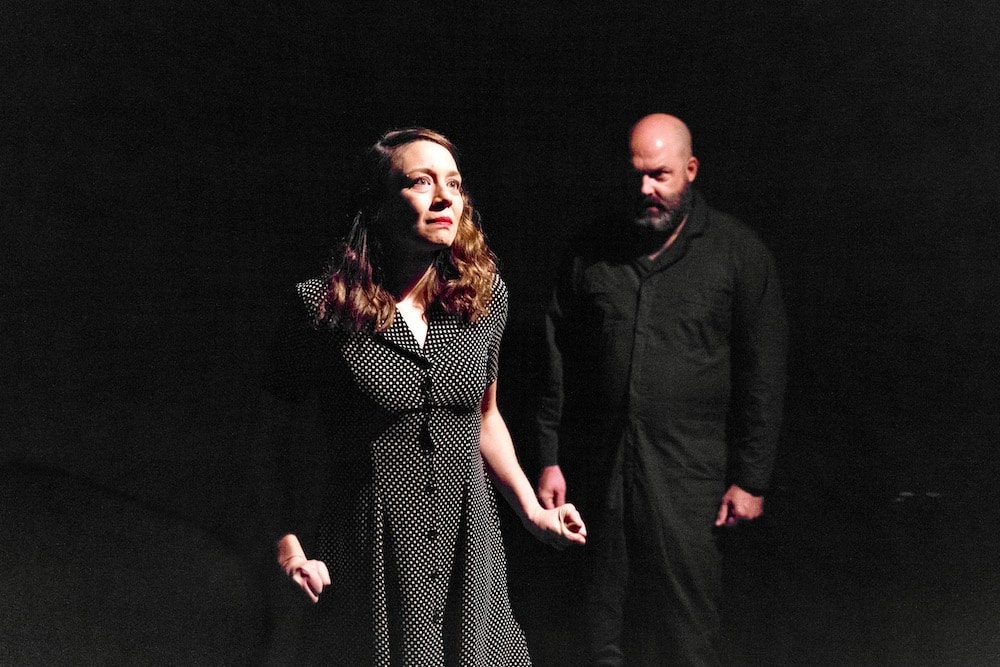“It feels unknown. This is nowhere somehow,” says a character in this intriguingly cryptic poetic play by the acclaimed Norwegian playwright Jon Fosse. Indeed, where are we? And what is going on? Staged in a bare black box where six actors portray six characters in disconnect from one another, Scena Theatre’s production of ‘Sea’ churns with undercurrents of insinuation.
An enigmatic scene between Shipmaster (Buck O’Leary) and The Guitar Player (Greg Ongao) begins the play. Shipmaster keeps asserting that he is master of the ship and, without evidence, that they are at sea. Guitar Player keeps asking where are the others. This goes on. Then one by one actual others show up and say “I’m here.”

First to appear are The Man (Eamon Patrick Walsh) and The Woman (Sara Barker), who may have a romantic relationship—or at least The Man keeps asking The Woman longingly not to leave him. And then, far apart, enter The Older Man (Kim Curtis) and The Older Woman (Ellie Nicoll), who do turn out to seem a couple—though they scarcely ever speak to each other.
At a point The Woman implores The Older Woman and The Older Man to acknowledge her as their daughter. They ignore her, seeming neither to see nor hear her. At a later point The Guitar Player does the same; he implores them to recognize him as their son. Nothing. No response.
As if out of nowhere, The Woman praises The Guitar Player’s most beautiful guitar playing. He then plays soundlessly, like air guitar, and she dances to music only she seems to hear. In time everyone seems to hear the soundless beautiful guitar playing. Eventually they all dance to it, each in their own world.
And the fact that Sea may literally not be fathomable may be the point.

Jon Fosse, Europe’s most produced living playwright, has also authored novels, poems, plays, children’s books, essays, and journalism. His work has been translated into more than fifty languages. He has been mentioned in connection with the Nobel Prize for Literature. Yet Fosse’s plays are almost never staged in the United States. And I’ve pondered why.
Here is my hypothesis: Fosse’s unique theatrical voice—which has been compared to Beckett’s—is one that American ears don’t yet know how to hear.
“My way of writing plays is about restriction, to achieve concentration and intensity,” Fosse has said. “A play doesn’t necessarily need a lot of exterior drama, but it needs a strong inner tension, to be charged.”
Watching Sea one definitely gets that. There is no discernible plot, there are no character arcs as such, there’s not a clear time and place. But in every line and every silence in between there is tension that keeps one glued.
Also, Fosse has said, “Everything I’ve written can perhaps be called a sort of mystical realism—not ‘magical,’ but mystical.”
And one can readily recognize in Sea what is seemingly about real life…but actually most probably not.

Another quality evident in Sea is its ethnicity—a concept Americans don’t typically associate with pale-skinned people who live near Nordic fjords. But Fosse has said very specifically that an important influence on his writing is
the way of talking in these rural areas of Norway, where people are famous for not talking much. They are rather silent people, like the people in my plays. They are also famous for almost never expressing their feelings out loud, but the truth is that they have very strong feelings, and the feelings somehow come out in other words. You talk about something very usual, but underneath you are talking about something else…. That may explain why it is often said that the people where I grew up are always ironic. They are! They never say what they mean or feel, they say something else. The talk is at least double.
Thus Fosse’s language is distinctly spare, terse, oblique, plain-spoken, often lacking affect. Having grown up in Minnesota among folks whose forebears came from Fosse’s culture, I can relate. I recognize how such language functions to bury emotion. And so it was that watching Sea I came to appreciate the work of the six actors in this cast who have created a sense of the feelings packed down inside their intentionally unfeeling lines. I watched each of the six as they subtly did so. I was not moved. That was not the point. But I was greatly impressed that under Artistic Director Robert McNamara’s astute direction, an acting style materialized before my eyes that got at what Fosse tries to get at:
What language can say is just a very little bit of what there is. To me that is obvious. And my plays are, I think, somehow saying just this—what is the most important is impossible to say in the language of words. And if I manage to write well, I still can say what is not possible to say by words—it is said in the silences, the pauses, the breaks.
It is often said that the characters in my plays don’t manage to communicate. In a way it is obviously so. In another way it is not so at all, because they understand one another completely, I feel, they don’t need to complete the sentence to say what they want to say.
See Sea and be swept away by a deep dive into the unsaid.
Running Time: 55 minutes, with no intermission.
Sea plays through November 24, 2019, presented by SCENA Theatre performing at the DC Arts Center, 2438 18th St. NW, Washington, DC. Tickets are available online.
PRODUCTION CREDITS:
Resident Director: Gabriele Jakobi
Sound Designer: Denise Rose
Lighting Designer: Jonathan Alexander
Costume Designer: Mei Chen
Stage Manager: Mavonte Johnson
Assistant Director: Anne Nottage
RELATED columns about Jon Fosse by John Stoltenberg:
‘Someone Is Going to Come’ at Scena Theatre
‘Someone Is Going to Come’ (a workshop production) at Scena Theatre




